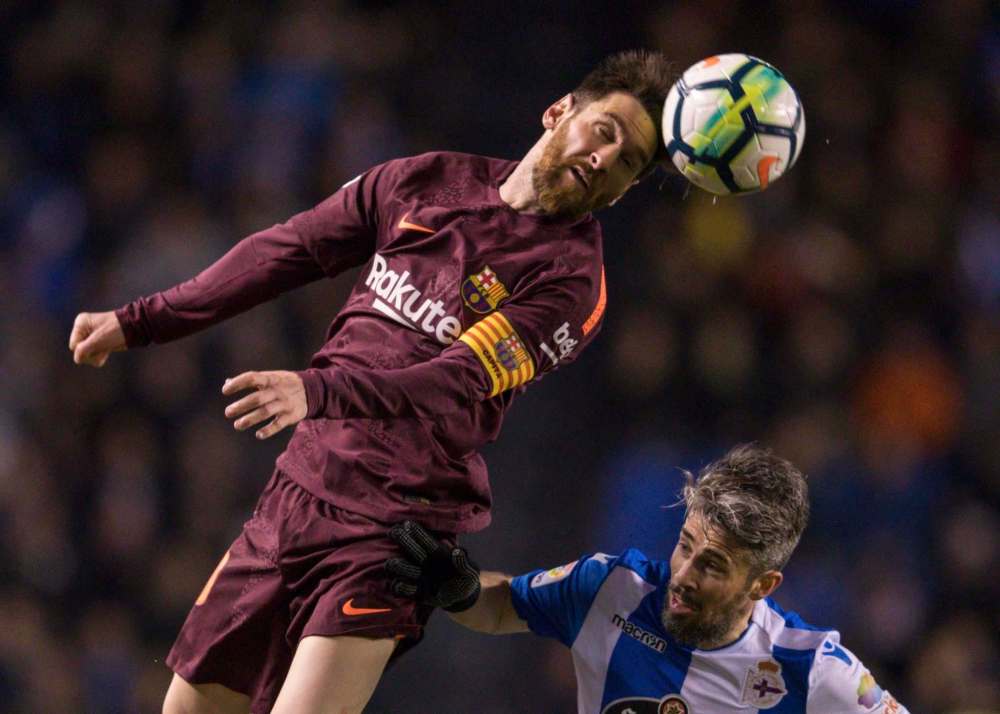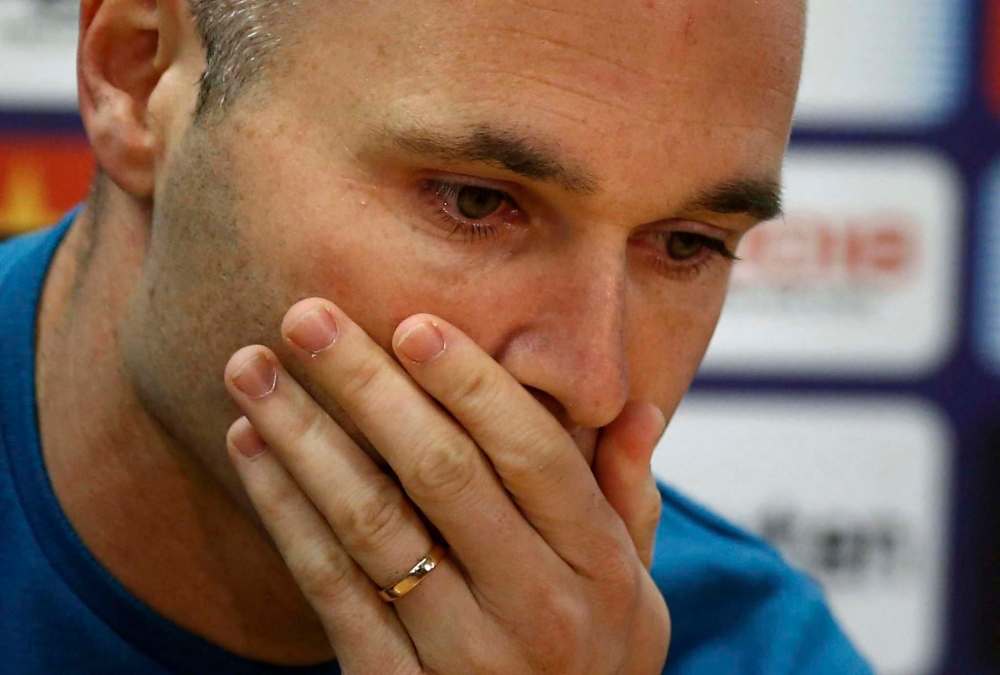El Clásico showcases era’s aging top players
Messi, Ronaldo take their kicks at La Liga rivalry
Advertisement
Read this article for free:
or
Already have an account? Log in here »
To continue reading, please subscribe:
Monthly Digital Subscription
$1 per week for 24 weeks*
- Enjoy unlimited reading on winnipegfreepress.com
- Read the E-Edition, our digital replica newspaper
- Access News Break, our award-winning app
- Play interactive puzzles
*Billed as $4.00 plus GST every four weeks. After 24 weeks, price increases to the regular rate of $19.00 plus GST every four weeks. Offer available to new and qualified returning subscribers only. Cancel any time.
Monthly Digital Subscription
$4.75/week*
- Enjoy unlimited reading on winnipegfreepress.com
- Read the E-Edition, our digital replica newspaper
- Access News Break, our award-winning app
- Play interactive puzzles
*Billed as $19 plus GST every four weeks. Cancel any time.
To continue reading, please subscribe:
Add Free Press access to your Brandon Sun subscription for only an additional
$1 for the first 4 weeks*
*Your next subscription payment will increase by $1.00 and you will be charged $16.99 plus GST for four weeks. After four weeks, your payment will increase to $23.99 plus GST every four weeks.
Read unlimited articles for free today:
or
Already have an account? Log in here »
Hey there, time traveller!
This article was published 04/05/2018 (2715 days ago), so information in it may no longer be current.
We sort of know — and we’ve sort of known it for a while — we’re living through a special period of football history. What we’re perhaps less honest about — and this is why our knowledge is only partial — is the reality that this extraordinary era, this golden age of Lionel Messi and Cristiano Ronaldo, of Barcelona and Real Madrid at the peak of their powers, is nearer to its end than its apex.
Sunday’s El Clásico (1:45 p.m., beIN Sports), for example, will be Andrés Iniesta’s last. At another time, without the shadows cast by two of the game’s best-ever players, one of whom is a teammate, he would surely have been even more appreciated than he is.
This most prominent of fixtures has also bid adiós to Barcelona pass-master Xavi Hernandez and iconic Madrid goalkeeper Iker Casillas in recent years, and the exceptional Neymar made a premature exit last summer when Paris Saint-Germain obliterated the transfer record to pry him from the Catalan capital.

Of course, so long as Messi and Ronaldo have been smashing goal-scoring records and more emulating their video game likenesses than any previous players they might be compared to, El Clásico has been as much about the spectacle of greatness as the national, historical and political rivalry — and probably even more so.
But, for how much longer?
Messi will turn 31 during this summer’s World Cup, and Ronaldo is already 33. Both continue to be in top physical shape, and Ronaldo in particular, prides himself on his fitness. Neither has suffered a debilitating, long-term injury, and if one of the two wins a record-extending six Ballon d’Or (both are currently on five) he will do so as one of the oldest footballers to win the sport’s most prestigious individual prize. (Fabio Cannavaro, for 2006, was the last winner aged 33 or older to claim the award. For the sake of trivia, Sir Stanley Matthews did so at 41 in 1956.)
In other words, it’s already remarkable the Argentine artist and Portuguese powerhouse have extended the world-class portions of their careers as long as they have, and we’ve perhaps perceived that endurance as a promise that their downturns, if we can even consider the inevitability of such, are somewhere out there, off in the distance.
They’re not, obviously. And, when the end comes, it will come quickly. For now, however, they are still the sport’s pre-eminent stars (although Mohamed Salah could have something to say about that for 2018), and Sunday’s match will showcase them at their finest. Their respective teams will also be anticipating this El Clásico as a clash of some magnitude, even if La Liga is already settled.
Earlier this week, Barcelona paraded the Primera Division trophy and Copa del Rey through the city’s streets — the former secured after beating Deportivo La Coruna on Sunday and the latter won with a 5-0 thrashing of Sevilla in the April 21 final.
The club has now won the Spanish title in seven of the last 10 seasons, and nine times in Messi’s 14 years as a first-team player — an epoch that has also included six Copas and four Champions Leagues.
Something they haven’t done, however, is gone an entire domestic campaign unbeaten.
They came close eight years ago, when they lost just once in La Liga. But, by rounding out their 2017-18 schedule with either wins or draws, they’d become the first post-war team in Spanish football to accomplish the feat. Doing so will be their primary motivation on Sunday.
Madrid, meanwhile, will no doubt want to prevent its arch-rivals having the descriptor “invincibles” attached to them — especially as it was the Meringues, back in the early 1930s, who last went pole to pole without defeat. They could also still finish behind Valencia in fourth, so there is the table to think about, as well.
But it’s the upcoming Champions League final that will dominate their thoughts, preparations and performances from Sunday’s match through to their May 26 appointment with Liverpool. Following this El Clásico, Real Madrid will host Celta Vigo and travel to Sevilla and Villarreal before boarding their flight to Kiev.

Manager Zinedine Zidane will spend that time attempting to hit the sweet spot between maintaining peak fitness and avoiding injury and fatigue.
After all, there is history to be made here, as well. Having triumphed in the Champions League in both 2016 and 2017, Madrid can become the first club to three-peat the European Cup since Bayern Munich in the mid-1970s, and the first since the establishment of the modern competition in 1992. Crucially, El Clásico will be their last contest of real consequence before facing the Reds in Ukraine.
Even without the stakes — which, admittedly, aren’t what they were foreseen to be when Barcelona-Real Madrid was scheduled for May — this El Clásico is special, and was always going to be special, simply because of Messi and Ronaldo.
We might not be able to say that in the not-too-distant future.
So, even if we only sort of know, and have sort of known for a while that this unprecedented era has extended into added time, let’s enjoy this El Clásico like it’s the last of its kind. Because, when the curtain finally falls on the age of Messi and Ronaldo, we’ll wish to goodness we could enjoy games like this, just once more.
jerradpeters@gmail.comTwitter @JerradPeters
History
Updated on Saturday, May 5, 2018 9:07 AM CDT: Added to columnists

